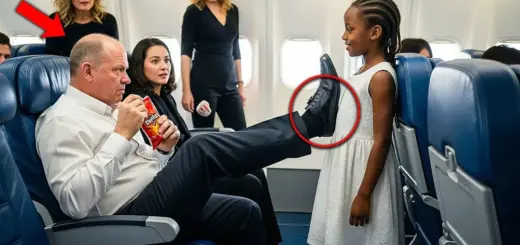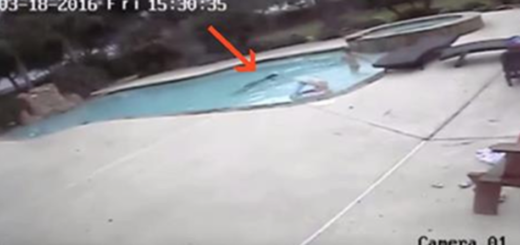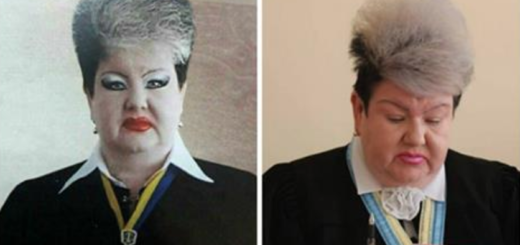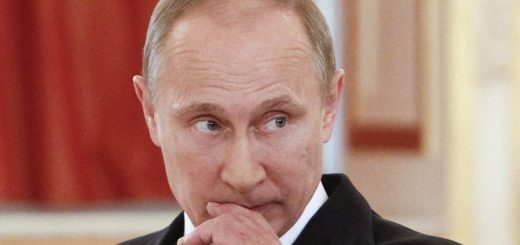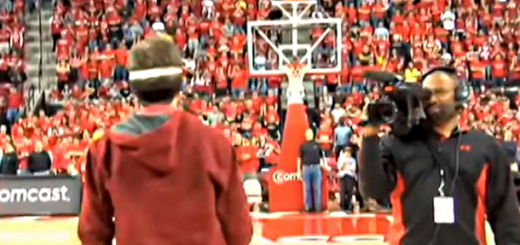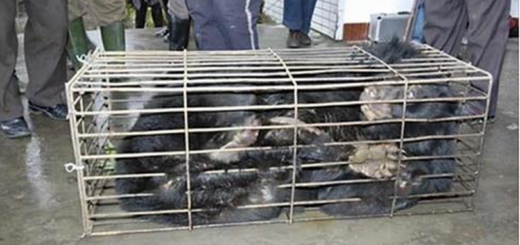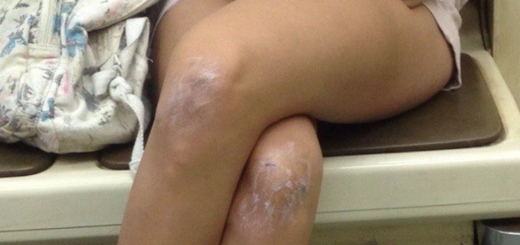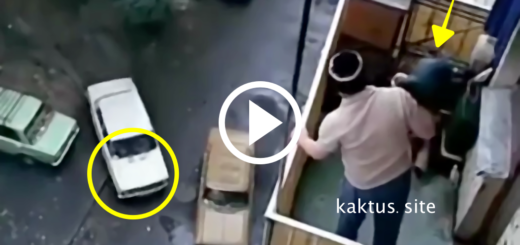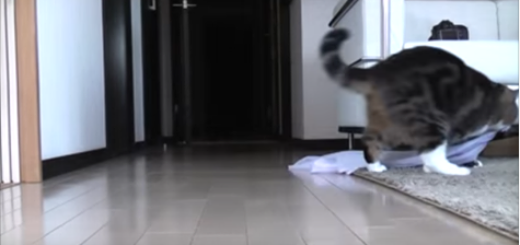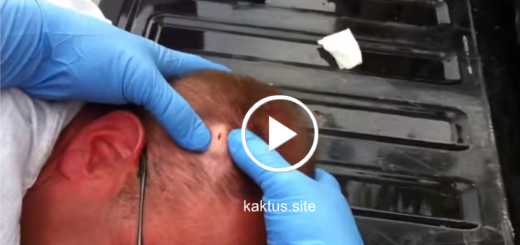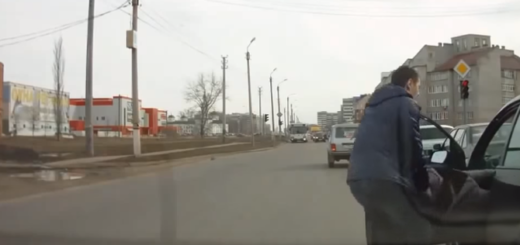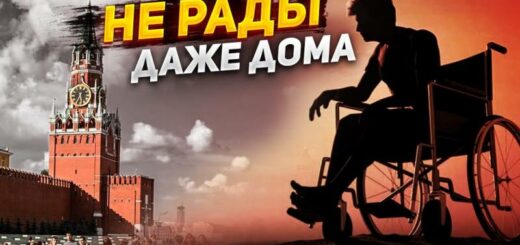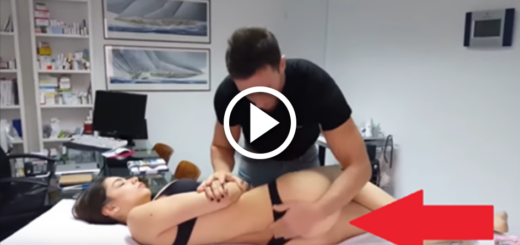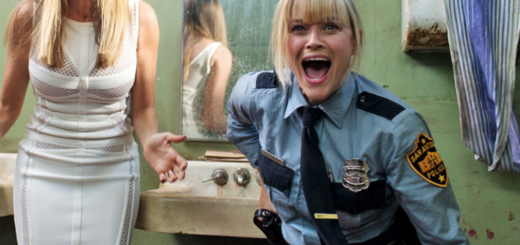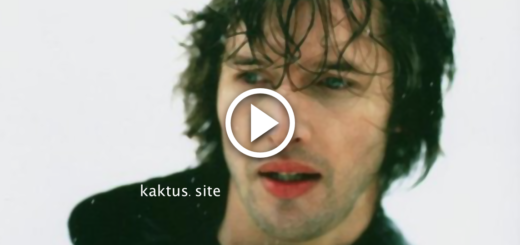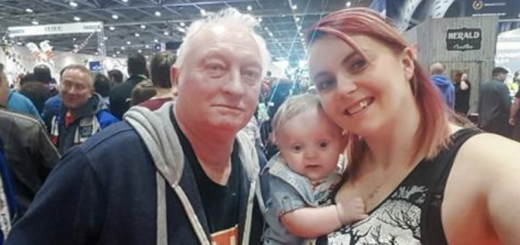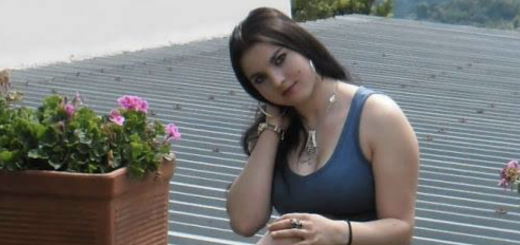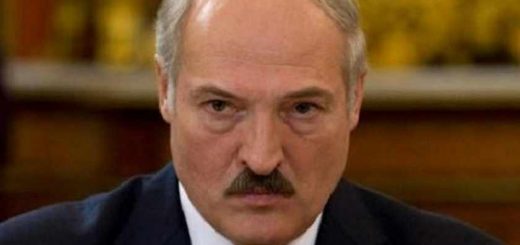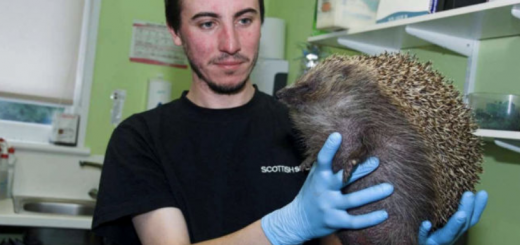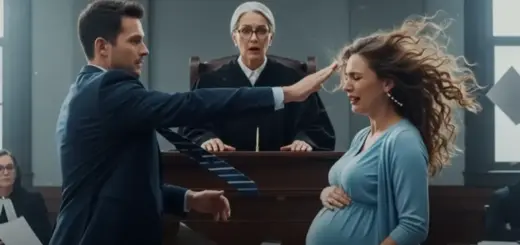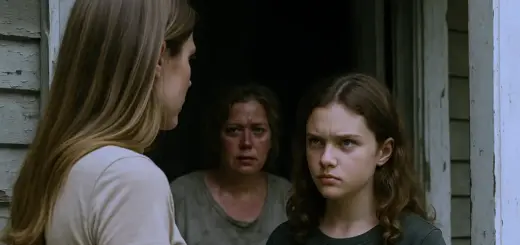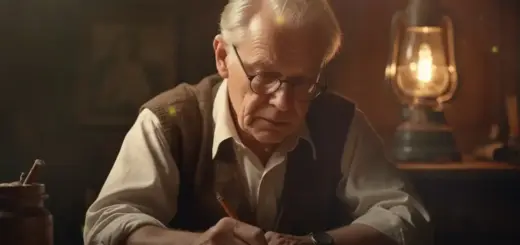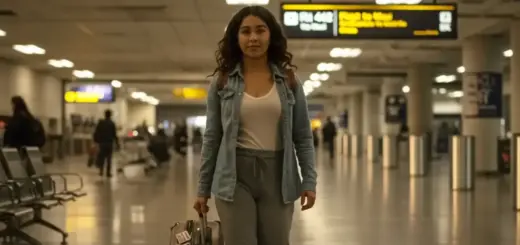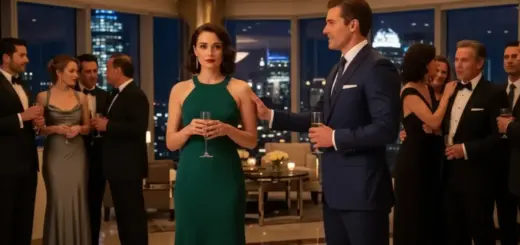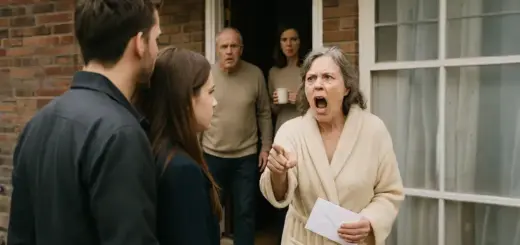As I stepped inside, Jennifer’s voice suddenly called out behind me, «Claire, wait.» She stood in the doorway of the penthouse, her makeup smeared, holding something in her hand. It was the necklace, a diamond piece she’d been showing off all evening.
«This necklace,» she said, her voice trembling. «You said it was bought with the Sherman Trust funds.»
«Check the purchase date against the withdrawal records. March 28th. Forty-two thousand dollars.» The words came out clinical, factual.
«You might want to take it off before the asset freeze hits Monday. They’ll consider it evidence.»
She yanked the necklace off so quickly the clasp broke, diamonds scattering across the marble like broken promises.
The elevator doors closed on her scrambling to collect them, and suddenly I was alone in that small mirrored space, descending. Thirty seconds. That’s what I gave myself. Thirty seconds to shake, to feel the magnitude of what I’d just done.
My hands trembled as I gripped the rail, my legs suddenly unsteady in heels that had carried me through twelve-hour surgeries but suddenly felt inadequate for this moment. Twenty-eight seconds. Twenty-nine. Thirty.
I straightened my spine, pulled out my phone, and typed a message to my lawyer. «It’s done. Everything is in motion. File the papers Monday morning.»
The response was immediate. «Security footage? They’ll have it all. Make sure Patterson knows.»
The elevator opened to the lobby, where the doorman nodded politely, oblivious to the destruction happening forty floors above. Outside, the valet brought my car around. I’d driven separately, knowing somehow that I’d need my own escape route.
The drive home was automatic, muscle memory navigating while my mind replayed every moment, every word, every expression on Caleb’s face as his world collapsed. Our house stood dark against the streetlights, looking exactly as it had when we’d left three hours ago, though everything had changed. I parked in the garage and sat for a moment, staring at Caleb’s golf clubs mounted on the wall, his mountain bike he never rode, the tool set he’d never opened—props in a performance of a life he’d wanted people to think he lived.
Inside, I moved with purpose. Box after box came up from the basement storage room, the good ones we’d saved from our wedding gifts, sturdy and clean. His Harvard diploma came off the wall first, the frame heavier than expected, the glass reflecting my face back at me like an accusation. Into the box it went, followed by his collection of cufflinks arranged in their velvet case, each pair a gift from clients whose money he’d been stealing.
My phone buzzed continuously, Caleb’s name appearing over and over. I let it ring as I packed his suits, each one pressed and hanging in garment bags, his shoes polished and paired, the watch his father had given him for graduation. I held it for a moment, remembering how proud he’d been, how he’d shown it to everyone at dinner that night. His father, whose pension fund Caleb had been draining.
A text broke through: «Claire, please, let me explain.» Then another: «You don’t understand the pressure I’ve been under.» And another: «You’ve ruined everything, my whole life.»
Followed by: «I’ll make you pay for this.» Then: «Please come back. We can fix this.»
The emotional whiplash of his messages might have affected me once. Now they were just evidence of a man scrambling for any handhold as he fell. I found our wedding album in the bottom drawer of his desk, hidden under tax documents.
The cover was ivory leather with our initials embossed in gold. Inside, that woman in white smiled back at me, radiant with certainty about her future. Caleb stood beside her, his hand on her waist, looking at her like she was everything he’d ever wanted.
When had that look changed? When had she become an accessory to be managed rather than a partner to be cherished? The tears came then, not for him or for us, but for her. That woman who’d believed in forever, who’d thought love meant something more than performance and possession.
I sat on the floor of his office, surrounded by boxes of his life, and cried for the death of her naive faith in happy endings. My phone rang. Emma’s name appeared on the screen.
«I saw Jennifer’s Instagram story,» my sister said without preamble. «It cut off mid-scene, but there was screaming. Are you okay?»
«Can you come?» My voice sounded raw, unfamiliar.
«I’m already in the car. Be there in three hours.»
The next morning arrived gray and quiet. Emma had arrived at 2 a.m. with a suitcase and a bag of groceries, finding me asleep on the couch surrounded by boxes. She’d covered me with a blanket and started making coffee, the smell pulling me from restless dreams about falling diamonds and marble floors.
«You have a meeting,» she said, handing me a cup. «David Patterson. 9 a.m. Cafe Luna.»
I’d forgotten I’d told her about it during our late-night planning session. Patterson was already there when I arrived, sitting in a corner booth with clear sight lines to both exits. Habits of the profession, I supposed.
He stood when he saw me, professional but not unkind. «Mrs. Hartley.»
«Soon to be Ms. Morrison again.»
He nodded, understanding.
I slid the USB drive across the table, three years of evidence compressed into a device smaller than my thumb. «My mother noticed it first,» I explained. «She’s a retired accountant, does our taxes as a favor.»
«Small discrepancies that didn’t match our reported income. I started documenting everything after that.»
Patterson reviewed the files on his laptop, his expression growing more serious with each document.
«This is comprehensive. With what you revealed last night and this documentation, we have enough for federal charges. Caleb’s assets will be frozen by noon. Marcus Whitfield and Tyler Coleman are now also under investigation.»
«And my immunity agreement?»
«Ironclad. You were unaware of the criminal activity when it began. You reported it as soon as you discovered it, and you’re cooperating fully. You’re protected.»
Back home, Emma had rearranged the furniture, pushing Caleb’s chair into the garage, centering the couch I’d bought before meeting him. The one he’d always complained was too soft, too blue, too something. «He hated this couch,» I said, sinking into it.
«Remember when he made you skip Dad’s 70th birthday?» Emma said suddenly. «Said it was a critical client dinner?»
I nodded, remembering the disappointment in our father’s voice when I’d called to cancel.
«I saw Instagram photos that night. He was at some club opening with that crowd. No clients, just champagne and people who weren’t you.»
We sat in comfortable silence, sisters who’d grown apart during my marriage now finding their way back. Emma pulled out her laptop and together we began making lists. Lawyer appointments, financial advisors, therapeutic support—practical steps toward a life that would be mine alone.
Monday morning arrived with unexpected sunshine streaming through the hospital windows. Emma had left for Milwaukee at dawn, promising to return next weekend, and I’d driven to Northwestern Memorial on autopilot, my mind carefully compartmentalized between the surgery ahead and the knowledge of what was happening across the city. The patient was 17, a basketball player from Lincoln Park High who’d collapsed during practice with a previously undetected heart defect.
His parents sat in the waiting room, holding hands with the same desperate hope I’d seen hundreds of times before. I focused on their faces as I explained the procedure, using their fear to anchor myself in this moment, this purpose, this life that existed separate from the destruction unfolding in downtown office buildings. In the operating room, my team assembled with practiced efficiency.
Dr. Rodriguez, my senior resident, studied the monitors while making notes. Sarah, my favorite surgical nurse, laid out instruments with methodical precision. They moved around me like a well-rehearsed orchestra, unaware their conductor was internally tracking time, knowing that at exactly 10 a.m., FBI agents would be walking into Davidson, Kline, and Associates.
«Scalpel,» I said, my voice steady through the surgical mask. The weight of the instrument in my hand felt like truth, like something real and purposeful. Here in this sterile room, with its controlled environment and clear objectives, I could save a life while another life, the one I’d built with Caleb, officially ended.
The surgery stretched into its third hour when Dr. Rodriguez commented on my unusual calm. «You’re different today, Dr. Morrison. More focused somehow.»
If only he knew that every precise cut, every careful suture was a meditation against imagining Caleb’s face when agents entered that conference room. The partner meeting always started at 10 sharp. Davidson would be mid-presentation about quarterly projections when the doors would open. The arrests would be public, visible, impossible to spin or explain away.
Four hours in, we encountered unexpected scar tissue from an old injury the boy hadn’t mentioned. I worked through it methodically, rerouting vessels with the same patience I’d used to document three years of financial crimes. Every challenge in this surgery could be solved with skill and persistence. Unlike marriages built on lies, hearts could actually be repaired.
Seven hours and 14 minutes after the first incision, I closed the final suture. The boy’s heart beat strong and steady on the monitors, a rhythm that would carry him through decades of games and graduations and all the life Caleb had tried to steal from retirees whose pensions he’d plundered. «Beautiful work,» Dr. Rodriguez said as we scrubbed out. «That kid’s going to play college ball because of you.»
I peeled off my surgical cap, my hair damp with perspiration, and checked my phone. Seventeen missed calls. Three from numbers I didn’t recognize—likely reporters. The rest were from various partners at Caleb’s firm. The news had broken.
In my office, I’d barely sat down when Jennifer Whitfield appeared in my doorway. Gone was the perfectly coiffed woman from Friday night’s party. Her designer clothes had been replaced with a simple sundress from Target. Her face was bare of makeup except for streaks of mascara that suggested she’d been crying in her car.
«Can I come in?» Her voice was small, uncertain. I gestured to the chair across from my desk. She sat carefully, as if she might break something, including herself.
«Marcus was arrested an hour ago,» she said, the words tumbling out. «They came to the house. The FBI. They had a warrant.»
«They took everything. Computers, files, even our phones. I had to borrow my neighbor’s cell just to make calls.»
I waited, not offering comfort or condemnation, just space for her to continue.
«Our accounts are frozen. All of them. Even my personal checking account from before we married.»
«I can’t access anything.» She laughed, but it was hollow, broken. «I went to three ATMs trying to get cash for gas. The girl at the bank looked at me with such pity when she explained the federal hold.»
«I’m sorry you’re going through this,» I said, meaning it. Whatever Jennifer’s faults, she hadn’t orchestrated the crimes.
«Are you?» She looked up sharply.
«Because I laughed. Friday night when Caleb said those things to you, I laughed. I’ve laughed at you for years, Claire. Every party, every gathering, we all did.»
«We called you the ice queen, the robot surgeon who didn’t know how to have fun.» The confession hung between us like a scalpel waiting to cut.
«And the whole time,» she continued, tears falling freely now, «Marcus was stealing from his own father. From clients who trusted him. He had affairs. Multiple affairs. There’s apparently a whole separate credit card I never knew about. The FBI agent asked me about trips to Vegas I didn’t even know happened.»
She pulled a tissue from her purse. A regular purse, not the designer bag she usually carried. «I was so busy feeling superior to you, laughing at your marriage, that I never looked at my own. We were living the same lie, except you were smart enough to see it.»
My desk phone rang. I let it go to voicemail, but the display showed a name that made Jennifer flinch: Davidson, Kline, and Associates.
«They’re all calling me,» I said. «Former colleagues of Caleb’s. Some fishing for information, trying to figure out their exposure. Others wanting to distance themselves, make sure I know they had no idea what was happening.»
«Did they know?» Jennifer asked.
My phone buzzed with a text from a number I recognized: Caleb’s former assistant, Meredith.
«Dr. Morrison, I wanted you to know that we all knew about Amanda. About the others too. I’m sorry we never said anything.»
«He used to brag about it at happy hours, said you were too focused on work to notice. Said he was planning to leave once the Singapore deal closed.»
«I kept documentation if you need it for divorce proceedings.»
I showed Jennifer the message. She read it twice, her face crumpling.
«They all knew,» she whispered. «At every party, every dinner, they all knew our husbands were destroying us for sport.»
My phone rang again. This time I recognized the number: Eleanor Hartley, Caleb’s mother. I’d been dreading this call.
«I should take this,» I told Jennifer. She stood to leave, then paused at the door.
«Claire, that strength they mocked you for? Don’t lose it. It’s the only reason you’re still standing while the rest of us are falling apart.»
Eleanor’s voice was crisp when I answered, decades of southern breeding barely concealing her emotion. «Claire, I owe you an apology.»
Not «hello,» not «how are you.» Straight to the point, like always.
«I’ve been a terrible mother-in-law. I disapproved of your career. Thought you should focus on giving me grandchildren. Criticized you for not supporting Caleb’s ambitions properly.»
I said nothing, letting her continue.
«I hired an investigator six months ago,» she said. «The pension account irregularities were too obvious to ignore. I know everything: the affairs, the stealing, the lies.»
«I’ve already spoken to the federal prosecutor. I’ll testify against my own son if necessary.»
«He was trying to transfer the house into my name. Did you know that?»
«To hide assets from potential lawsuits. The paperwork was drawn up but never filed. He must have gotten distracted by his scheming.» She paused. «I raised him better than this. His father would be devastated.»
Three months had passed since the arrests, and Autumn had turned Chicago’s skyline into a study of gray and gold. I sat in my home office, the one Caleb had never entered because it was too cluttered with medical journals, composing an email to Malcolm Chin, a financial blogger whose readership included every major firm in the city. The subject line read simply: «Documentation You Should See.»
The attachments included court filings, arrest records, and a detailed timeline of the fraud that I’d compiled with my lawyer’s blessing. Every document was public record but scattered across different databases. I was simply consolidating them into one devastating package that would appear first whenever anyone searched Caleb’s name for the next decade.
My phone buzzed with a text from Amanda. We’d been in contact since I’d connected her with Patricia Alconquo, an attorney who specialized in cases against predatory executives.
«Lawsuit filed this morning. Emotional distress and pregnancy discrimination. Patricia says the timing with your document release is perfect. Thank you, Claire.»
I’d never expected to become allies with my husband’s mistress, but Amanda had been a victim too. She was 23 years old, told she was special, promised a future that was never going to materialize. She was seven months pregnant now, living with her parents in Iowa, rebuilding a life that Caleb had derailed with his lies.
That evening, I attended the Chicago Children’s Hospital Charity Gala, the same event where I’d met Caleb six years ago. Back then, I’d been the promising young surgeon he’d pursued. Now, I walked in alone, my presence creating ripples of whispered conversations throughout the ballroom.
«Claire, darling,» Margaret Whitestone approached, her smile tight with curiosity. «How brave of you to come.»
Brave.
As if attending a charity event required courage. As if I were the one who should be hiding. «The children’s ward needs support regardless of personal circumstances,» I replied, accepting a champagne flute from a passing server.
Throughout the evening, I watched the social choreography unfold. Caleb’s former colleagues clustered in corners, their bodies angled away from anyone tainted by association with the scandal. Marcus’s former clients moved through the room like refugees, trying to establish new alliances while their frozen assets left them scrambling.



